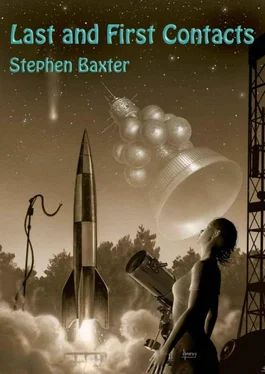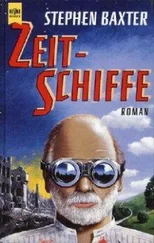Stephen Baxter - Last and First Contacts
Здесь есть возможность читать онлайн «Stephen Baxter - Last and First Contacts» весь текст электронной книги совершенно бесплатно (целиком полную версию без сокращений). В некоторых случаях можно слушать аудио, скачать через торрент в формате fb2 и присутствует краткое содержание. Город: London, Год выпуска: 2012, ISBN: 2012, Издательство: NewCon Press, Жанр: Фантастика и фэнтези, на английском языке. Описание произведения, (предисловие) а так же отзывы посетителей доступны на портале библиотеки ЛибКат.
- Название:Last and First Contacts
- Автор:
- Издательство:NewCon Press
- Жанр:
- Год:2012
- Город:London
- ISBN:978-1-907069-40-6
- Рейтинг книги:5 / 5. Голосов: 1
-
Избранное:Добавить в избранное
- Отзывы:
-
Ваша оценка:
- 100
- 1
- 2
- 3
- 4
- 5
Last and First Contacts: краткое содержание, описание и аннотация
Предлагаем к чтению аннотацию, описание, краткое содержание или предисловие (зависит от того, что написал сам автор книги «Last and First Contacts»). Если вы не нашли необходимую информацию о книге — напишите в комментариях, мы постараемся отыскать её.
Last and First Contacts
Last and First Contacts — читать онлайн бесплатно полную книгу (весь текст) целиком
Ниже представлен текст книги, разбитый по страницам. Система сохранения места последней прочитанной страницы, позволяет с удобством читать онлайн бесплатно книгу «Last and First Contacts», без необходимости каждый раз заново искать на чём Вы остановились. Поставьте закладку, и сможете в любой момент перейти на страницу, на которой закончили чтение.
Интервал:
Закладка:
‘Beginning on Mars,’ Bisset said.
‘Well, that’s true. And everywhere there is standing liquid, water or perhaps hydrocarbons, you get mounds.’
‘Stromatolites.’
The pedant in me objected, although I use the word myself. ‘Strictly speaking, stromatolites are terrestrial forms of blue-green algae. These bacteria are photosynthetic but they’re not algae. You can see they are purplish, not green. They don’t use chlorophyll; their chemistry kit is adapted to the spectrum of their sun. So these mounds are like stromatolites, but—’
‘“What’s in a name? That which we call a rose by any other name would smell as sweet.”’
‘More Shakespeare?’
‘Sorry. It’s a bad habit.’
‘The mound bugs here are related to us, of course, although we’ve yet to classify them.’
It would have been a major shock if GC-IV’s bugs hadn’t been a distant relation of our own, their carbon-water chemistry dictated by a kind of skewed DNA. One of the triumphs of the IXA’s exobiology programme has been to establish that all the carbon-water life forms we have found are related, apparently descended from an ancestor that came blowing in from outside the Galaxy altogether. Subsequent ‘generations’ had spread by panspermia processes from star to star. But that origin theory is controversial; the family tree of galactic life is still incomplete. Some even believe that the ultimate origin isn’t carbon-water at all, but lies in a deeper substrate of reality.
‘And,’ Bisset said, ‘there is mind. There, in those mounds.’
‘Oh, yes. Ramone, even though we have only found microbes – no multi-celled life forms like ourselves – there is mind everywhere we look.’ Everywhere there is a network to be built, messages to be passed, complexity to be explored, you’ll find a mind. Again Mars was the prototype, with the billion-year thoughts of its microbial mats locked in that little world’s permafrost layers. ‘You can see we labelled the mounds with marker dye. For the cognitive mapping we looked for the best specimen – the most intricate structure, the least damaged. We picked her.’ I pointed to the larger mound, over which the sensor net had been laid.
‘“Her”?’
A bit sheepishly I said, ‘Anthropomorphising is a bad habit of animists. We call her Juliet. We labelled the mounds – see, that’s Alpha, that’s Bravo, Charlie, Delta, Echo—’
‘And Juliet. Oh, it’s the old NATO phonetic alphabet, isn’t it? My father was a copper on the streets of London, and they used the alphabet for their call signs. He was Sierra Oscar One Nine… ’
I admit I switched off. Why are old peoples’ anecdotes always so damn dull? It doesn’t seem adaptive, evolutionarily speaking.
‘And you can trace her thoughts,’ he said now. ‘Juliet’s. That’s a question of detecting biochemical impulses, right?’
‘We have an analytic technique called animistic deconvolution. It’s possible to break the characteristic signals of a mind into its component parts. You’d be surprised by the commonalities we find.’
He surprised me with his next question. ‘Does she understand death?’
‘Why, I don’t know. Ramone, these minds are not like ours. She doesn’t need to know death. As long as the pond survives Juliet will always be renewed, by one bacterial layer over another. She’s effectively immortal.’
‘Except that tomorrow all this will be destroyed. The mounds, the lake—’
I watched his face. This wasn’t the first young system I had visited; I had come across such reactions as Bisset’s before. ‘This stellar system is unfinished. Just a swarm of worldlets. Collisions are the order of the day, Ramone. In fact it’s the way planets are built.’
‘A rough sculpting.’
‘Indeed. GC-IV is around a hundred million years old – that is, since the last collision big enough to melt the surface. A scummy crust formed in a few million years, comets delivered ocean water, life drifted in from space. Continents, oceans, lakes, air – it all comes together in an eyeblink of geological time. In between catastrophes, you see, there is time for life. But GC-IV hasn’t finished being built yet. It happened to Earth.’
‘But in a few days, everything alive now will be gone.’ He craned his head, looking up at the sky. ‘Is it possible Juliet knows the Hammer is coming?’
‘I don’t see how.’
‘Do you think we should warn her?’
‘No,’ I said firmly. ‘Even if we could, we shouldn’t try.’ Xenoethics is a new and uncertain field. As for me, I trained as a doctor. I don’t believe in intervening if there’s a risk you can do more harm than good. ‘We can’t lift off a whole biosphere – we couldn’t even save Juliet; she’s too fragile. All we can do is take a few samples, make a record of what was here. Wouldn’t it be cruel to interfere?’
‘I don’t know,’ he said simply.
He was interrupted by a slap on the back. It was Ulf Thoring, his team leader. ‘I wondered where you got to, granddad. I patched your comms frequency into the crew and we’ve been having a bit of a laugh.’ He was Icelandic. His accent was strong, his English slightly off-key.
I said angrily, ‘You’ve got no manners, Ulf.’
‘Oh, come on. I heard it all. Are you falling in love with Juliet, granddad? She isn’t really a girl, you know. Talk about a doomed romance! What do you want to do, save her or fuck her? We could fix you up an interface. Unless your little old pizzle is too worn out—’
‘Enough. This is Zuba.’ Her voice in my phones was deep and peremptory. I was impressed the Captain was listening in, but her command was built on an attention to detail. ‘You scientist types are nothing but trouble. Thoring, you need to learn some respect. You’re on fatigues at the end of your shift.’
‘Yes, sir,’ Thoring said. But Zuba couldn’t see his face, and he winked at me, insolent.
‘In the meantime we’ve got more work to do than time left to do it in. Get on with it.’
We all murmured acquiescence.
Thoring slapped Bisset on the back again. ‘It’s only a bit of a laugh, Ramone.’
Bisset just looked down on him from his greater height. ‘It’s okay.’
Ulf walked off towards the tractor that his buddies from Stockholm were loading up with their laser towers and sensor stations.
Bisset turned to me. ‘Just tell me one more thing. What do you believe she’s thinking, right now? Juliet. One word.’
I glanced at the summary analysis on my monitor. Some agitation showed there. ‘One word? …’ I have always regretted the word I chose to use, as I believe it was the trigger for what followed. ‘Fear. Actually, Ramone, I think she’s afraid.’
Bisset stared long and hard at Juliet, under her cognitive cap, surrounded by joshing young animists. Then he turned away and followed Ulf Thoring.
The next day was our last on CG-IV – indeed, it was the day of the impact.
‘Knilans, Zuba. You’d better get down here.’
I was confused. ‘Where?’
‘The lake.’
We’d already packed up at the lake. I was in the biolab, labelling samples and sorting out my records. There was less than twelve hours left before the Hammer was due to fall. I hadn’t expected ever to set foot on the planet again. ‘What’s going on?’
‘Bisset. He has a problem.’
‘Ramone? I haven’t seen him today. And he’s not my responsibility. He’s in Ulf’s team.’
‘Ulf is the problem. Look, I know you’ve talked to Bisset. We need to get this fixed. Zuba out.’
I suited up, hurried out of the ship, and requisitioned a tractor that was in the process of being disassembled for flight.
Читать дальшеИнтервал:
Закладка:
Похожие книги на «Last and First Contacts»
Представляем Вашему вниманию похожие книги на «Last and First Contacts» списком для выбора. Мы отобрали схожую по названию и смыслу литературу в надежде предоставить читателям больше вариантов отыскать новые, интересные, ещё непрочитанные произведения.
Обсуждение, отзывы о книге «Last and First Contacts» и просто собственные мнения читателей. Оставьте ваши комментарии, напишите, что Вы думаете о произведении, его смысле или главных героях. Укажите что конкретно понравилось, а что нет, и почему Вы так считаете.












